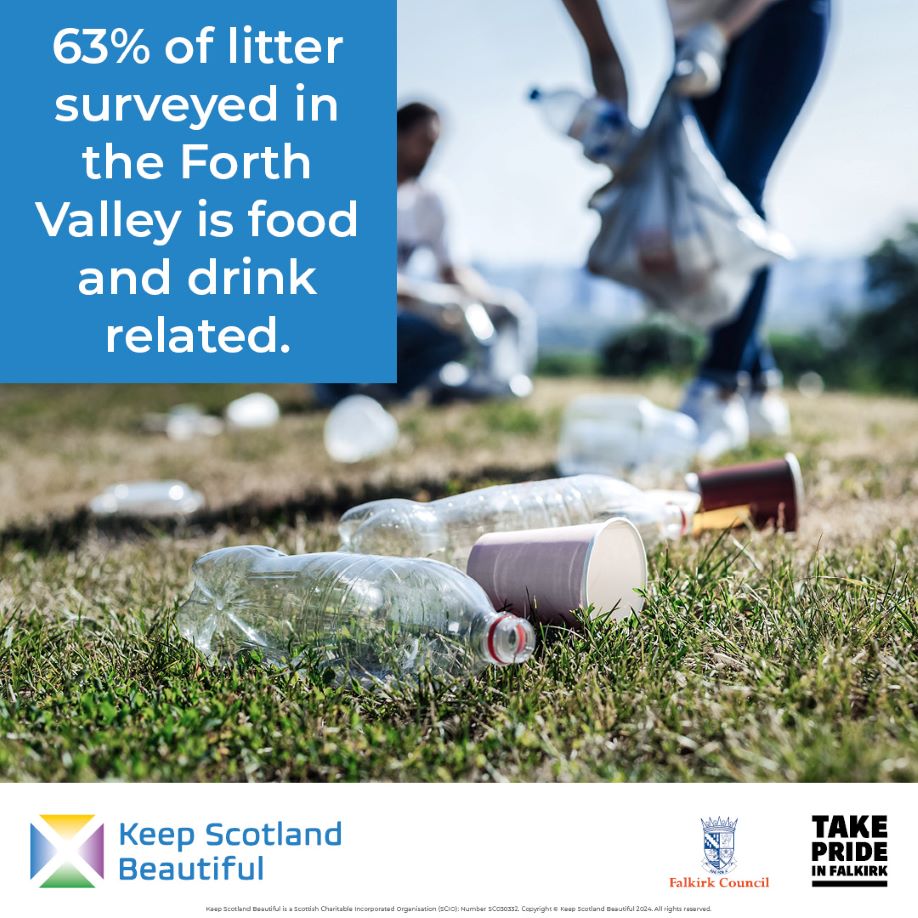
Single-use packaging generated from our love of on-the-go food and drink is being tackled with an innovative collaboration between ourselves, Forth Valley College, local authorities in Stirling, Clackmannanshire and Falkirk and Coca-Cola Europacific Partners (CCEP).
With its main campuses located in Alloa, Falkirk and Stirling, Forth Valley College students and employees have been asked to consider how they can help reduce the on-the-go food and drink litter which accounts for 63% of all litter counted across the three sites.
To reduce on-the-go food and drink litter and improve recycling, street bins near the three campuses have been wrapped with engaging messaging, a billboard and targeted digital online advertising will be deployed, and increased recycling provision will be introduced on-campus during a seven-week campaign targeting Forth Valley College students and staff and the wider community until the end of March.
Students and staff were asked for their views earlier this year and 78% confirmed they enjoy at least one item of on-the-go food or drink each week. But, with 75% indicating the damage that on-the-go food and drink litter could do to the environment and nature was of concern to them, and 85% being concerned about the amount of littered packaging there was from on-the-go food and drink, it is clear now is the time to tackle the problem.
Barry Fisher, our Chief Executive, said: “We all enjoy on-the-go food and drink whether it is a sandwich, a bag of crisps, a chocolate bar or a can of soft drink. A quarter of litter recorded in our national surveys comes from food and drink packaging and the Scottish Litter Survey found 90% of people agree that litter is a problem across our country.
“So, it is vital that we encourage everyone to consider what they do with their packaging. Only by working in collaboration with national and local government, businesses and communities will we be able to test campaign messages and evaluate their success.
“Ultimately, we want to see people recycling where possible, but at the very least we need everyone to bin their waste and not to drop or chuck it – further deepening Scotland’s litter emergency.”
Forth Valley College Principal Kenny MacInnes, said: “We are delighted to be helping Keep Scotland Beautiful with their survey and their litter and recycling intervention delivery plan. This will raise awareness of the proper way to recycle among young people in the Forth Valley area, and where better to do that than in Forth Valley College. This initiative ties in well with our Sustainability and Net Zero plans and we are hopeful the awareness raised through this campaign will enhance our own efforts to recycle.”
Jo Padwick, Senior Sustainability Manager at Coca-Cola Europacific Partners GB, said: “We’re excited to partner with Keep Scotland Beautiful, Forth Valley College and local authorities on a campaign that will help support our mission of increasing recycling rates.
“As a brand well-loved in Scotland, we recognise the responsibility we have in ensuring as much of our packaging is recovered and recycled as possible. We’re striving towards a World Without Waste, and we’ve set ourselves a goal to collect and recycle a bottle or can for every one we sell by 2030. Collaborating with businesses and government organisations is one important way we can continue to drive our sustainability goals forward and look to create a more circular economy.”
Cllr Bryan Deakin, Falkirk Council’s spokesperson for Climate Change, said: “We are fully behind this campaign to encourage behaviour change towards what people do with their waste packaging. It doesn’t take much to find a recycling point or take any packaging away until they can recycle it properly. Litter costs us dearly in both our environment and the resources that are dedicated to cleaning up afterwards. There’s no excuse.”
This campaign to inspire behaviour change to reduce litter and increase recycling is being delivered by Keep Scotland Beautiful, a key delivery partner of the National Litter and Flytipping Strategy and Action Plan, and is partly funded by CCEP.